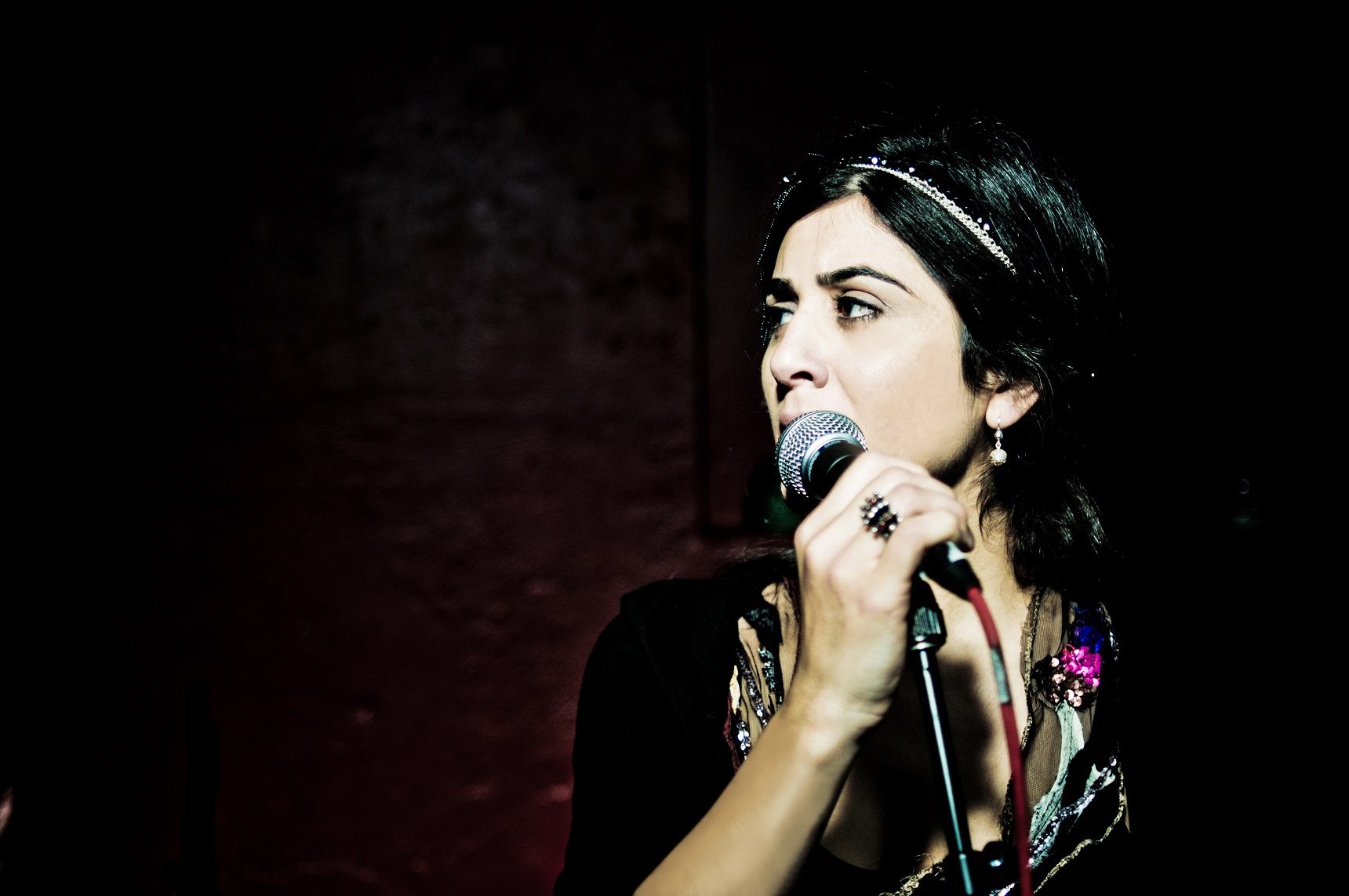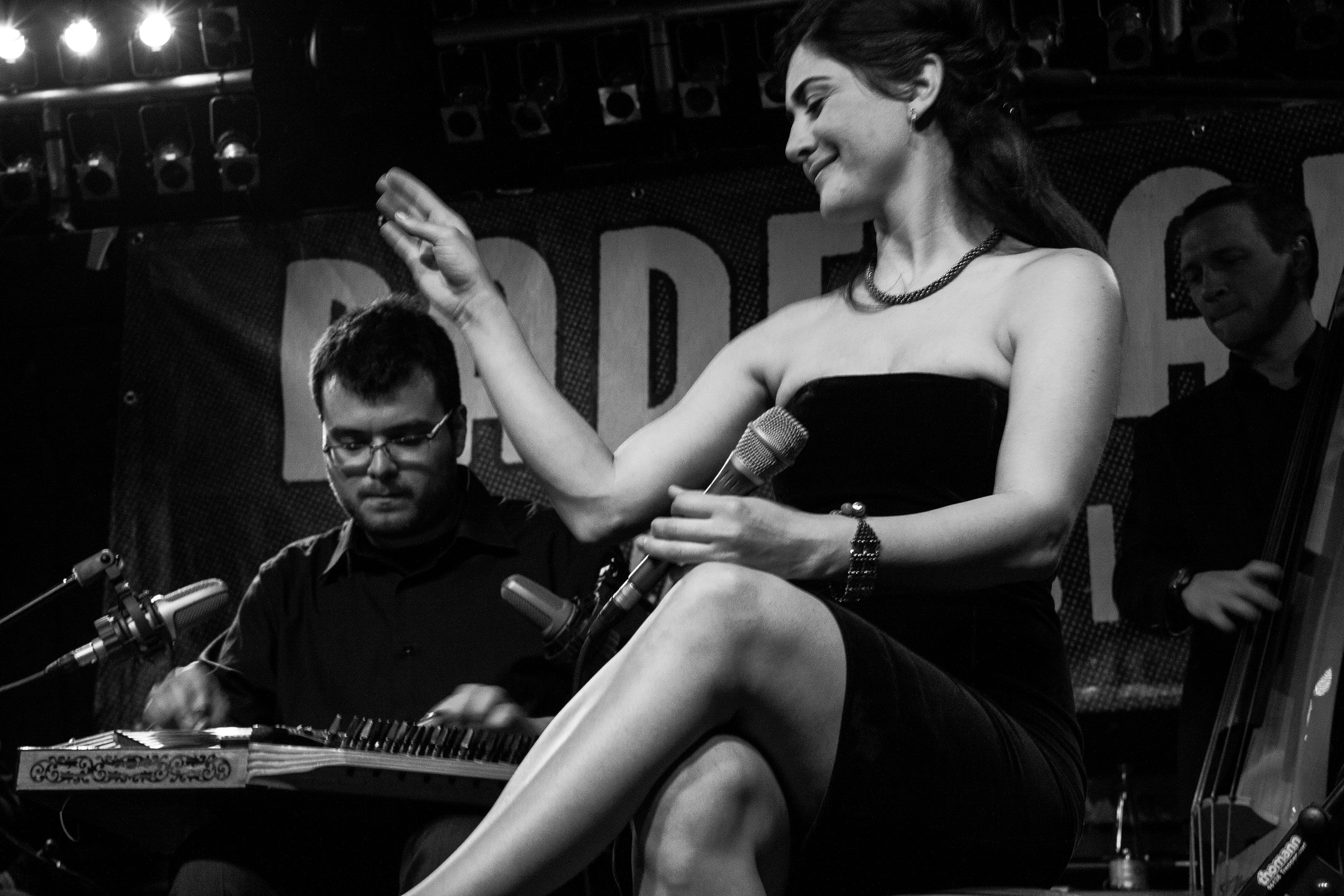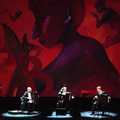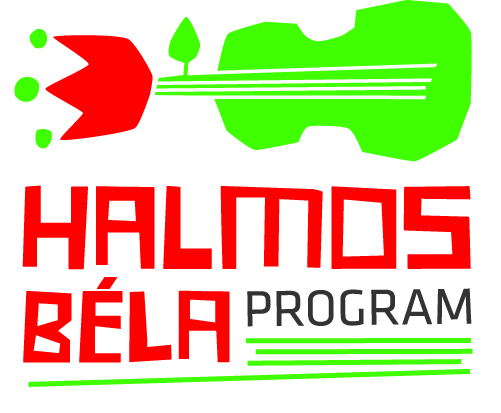
Finding the conscious, open minded, empathetic, natural and free spirit people of our world is a really powerful, energizing and encouraging experience. Cigdem Aslan grew up in Istanbul, where the extremities and the duality of the world is perceivable minute by minute, which, however teaches a lot about the real humanism and how to express the volition by acts, if we allow our mind to be able to see reality from a wide range of perspectives. As Cigdem Aslan's thinking is determined by the faith in the different cultural values, the respect and tolerance about them, at the same time she declares clearly her convictions about this issue also in her art. Her artistic freedom is given by her own moral principles. She is able to react to the actions of the world around her in her personal life and also in her art activities.
What are your first musical memories from your childhood?
My earliest musical memories are listening to my parents and siblings sing either at the family gatherings or at home randomly. Music is a very important part of the Alevi culture as it depends on oral traditions. So I was born into this specific kind of music. Later on as I grew up and met with the outside world of Istanbul, I inevitably met with the other sounds and cultures.
How did the music life of Istanbul make an effect on your life and music?How could you describe the cultural effects of Istanbul to your performance, to your music?
Istanbul carries so many influences which of course is the result of geographical, social, political and cultural status of the city. IIt is changing constantly and not it is not always for good but still we can find traces of the past in also in the present. Especially in the cultural side of things! And of course the population is still diverse- not as much as it used to be- and the diversity means more colours if you choose to see it that way. If you embrace it, it builds you. I am coming from the minority background and I've chosen to embrace these things.
How could you specify the Alevi culture in which you grew up? What kind of cultural elements does it have that we should know better in Europe?
Alevism is a syncretic belief system with more similarities to Budism and Zoroastranism. In Turkey it is considered as a sect of Islam but when you look at the religious practices you can see many differences
This might look very long but have a look at this notes I had prepared for a workshop in the past:
God in Alevism is Hakk, which means the truth. Alevis consider every living creature sacred as the carrier of an essence from God. Alevis call each other can (soul), which is gender-neutral name. As a result of this understanding, the position of women in Alevism is equal to that of men. Alevis consider god, cosmos and human in a total unity. This unity is symbolized with an exclamation, Hakk Muhammad Ali, which unities three most sacred person in Alevism, God, the Prophet Muhammed and Ali, cousin and son-in-law of the Prophet.
A well-known verse of Hallacı Mansur, a Sufi poet from the 10th century, indicates the unit of God and human in Alevism, Ene’l Hakk (I am one with God). The founder saint of Bektashism, Haji Bektash Veli, from the 13th century explains this importance with his saying “My Kaabe is the human being”.
Alevis do not consider God as fixed into a place of worship, iconography or written books but He is la-mekan (placeless) and human heart is his only domicile. Therefore, Alevis do not fear God but only bear love for him and they do not believe in paradise or hell but an infinite circulation until one reach the status of perfection and reunion with where he or she comes form.
Alevis consider all holy books and the prophets with great respect. Because, for them, the aim is one but ways to reach this aim can be various. This understanding prioritizes reason over dogma, as Haji Bektashi Veli says, “the end of the path would be dark if the path is not science.”
Alevis consider all nations as one regardless of ethnic, racial, gender and linguistic differences simply because each creature carries the same sacred essence. Humanism, egalitarianism, mutual assistance, and gender-equality are the main social characteristics commonly shared by Alevi communities. Their lodge-centered social organization is based on a kind of agrarian socialism.
A well-known sayings of Seyh Bedrettin, a religious scholar and rebel to the Ottoman Empire, “everything except the cheek of lover can be shared”, explains this egalitarianism perfectly. As a result, resisting against the injustice expressed with a phrase “allegiance with the oppressed (mazlum)” and “standing against the tyrant (zalim)” has become the main social attitudes in Alevism.
How is the music in alevi culture?
Music is the most significant component of Alevi cultural life. Its presence is felt everywhere. Anatolian folk music is mostly based on Alevis. The greatest minstrels of Turkey have emerged from the Alevi community. Music is one part of Alevi rituals. Dede or Zakir supplicates (niyaz) to saz three times before cem, and then starts playing. Saz is also called “the stringed holy book.” As they say, there is no word without the saz, and no saz without the words. Saz (bağlama) is a holy musical instrument for Alevis. The feelings, thought and beliefs of the folk are expressed with the accompaniment of music.
Do you think that it is important to find traces of the past in the present? In my view this is one of the main points of your music. That can be somehow a thread or guide of your work? How can you keep and convert your traditions and your cultural roots that you got from your family in an other kind of multicultural, let's say cosmopolitan city as London where you live now?
Again referring to the importance of oral traditions in my culture and how teachings and basics of it are carried forward from one generation to the other by music, storytelling, etc I think there is an internal tendency we are born with to respect and value traditions of all sorts. You can call it empathy:) But also brings the flexibility which is a great asset if you know how to be flexible without compromising.
I think rather than calling it converting one’s traditions we can think of melting it in a pot with other flavours and bringing out more delicious flavours!

How did you explore rebetiko for yourself? What are the main feelings and meanings of this music that you really like and you can feel that they are important parts of your personality?
I started singing Rebetiko/Smyrneiko in 2000 when I joined a band at Istanbul University. There was a music club at the student union and the band had a project of highlighting the cultural richness of Turkey by performing the songs of ethnic minorities in their original languages rather than assimmilated versions in Turkish. In our repertoire we had songs in Greek, Armenian, Kurdish, Ladino, Arabic and we had Alevi songs too. We all studied and learned all the songs but I was given the task to sing the rebetiko songs solo so I gave a little bit more attention to them. And singing them felt very natural at that time and still does... nobody in my family speaks Greek or knows about Rebetiko so the only logical explanation or connection I can make for this connection is Istanbul... One of my favourite poet Edip Cansever in one of his poems said:
"Man resembles the place he lives in
Resembles its water, its soil
The fish swimming in its sea
The flower pushing its soil"
Music is like that too...it resembles the place it lives in....this is one of the reasons why it changed after the population exchange. A very good friend of mine Ismail Keskin, who is the lyricist and the composer of the lullaby on my first album, once said to me "Rebetiko is the first refugee to arrive at Pireus port of Athens"
And from the rebetiko songs you get an insight to the lives of musicians, refugees, undergorund characters of the society....
You represent for me the woman independency with your musical carrier, do you have a concept of this with those musical styles that you've chosen to perform?
I think the devil-may-care attitude of the genre applies to me. We’re surrounded with many social, cultural, economical codes, structures, trends that we need to abide with as women, daughters, partners/wives, singers, as people from that place, this background, etc... Stereotyping is very restricting and the old time rebetes and rebetisas went against this codes and I am sure they felt freer.
With my musical career/ stance, in terms if representing independent women; I try to do that by choosing my repertoire carefully- choose songs where the women are ‘subjects’ not ‘objects’. Of course I don't sing about women only but still even if I really like a song musically if the lyrics are degrading for women they do not get to be sang by me!
Do you have other activities to show your presence in the social and political issues? Do you think that if someone is a well-know artist or performer it is important to have kind of social activities with that they can express and indicate themselves not only as musicians?
This is one way of being active not only as musician. I do also attend social or political activities from time to time to show solidarity with the causes I believe in. However I understand musicians or artist who don’t...artists could influence people as much or even more in their performances.
A bejegyzés trackback címe:
Kommentek:
A hozzászólások a vonatkozó jogszabályok értelmében felhasználói tartalomnak minősülnek, értük a szolgáltatás technikai üzemeltetője semmilyen felelősséget nem vállal, azokat nem ellenőrzi. Kifogás esetén forduljon a blog szerkesztőjéhez. Részletek a Felhasználási feltételekben és az adatvédelmi tájékoztatóban.


